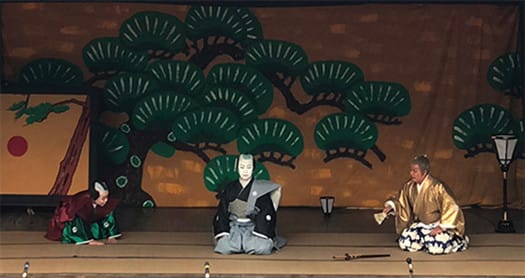



テレワーク全盛時代。わたしは普段、Macで作業をしております。
Appleはパソコンメーカーのなかで一番「画面解像度」数値に敏感な企業。
パソコン黎明期からユーザーにとってどういうアスペクト比が最適か、
それこそ最先端であれこれと検討しモニタ会社のいいなりではなかった。
いまのわたしのMacの使用解像度は1280×800ということなので、
比率で言うと1.6:1ということになる。
あ、前が左右幅で後ろが天地幅、タテヨコ比率ですね。
PCデスクトップというごく最近人類がそこでさまざまな活動を始めた
「視覚領域」の天地左右バランス。
確かにこれは人類にとって「意識下」領域で影響力の大きなものですね。
いろいろな感覚があり得るのですが、最初の頃のPC環境と比較すると
左右幅が段々と拡大していく傾向にあるように思います。
作業性というほとんど無意識的な領域のことであるので、
どのようにこのことに決定因子を考えていくか、
その選択に関与する根源的「視覚体験性」ということに興味が湧きます。
そもそも人類には目がふたつあってそのことで3次元を把握できるそうです。
しかしそれと同等に「視野」として世界の認識に深く関わっている。
文化としてPC画面に先行するのはテレビ画面の視野比率があるのでしょうし、
それ以前となれば、絵画や映画画面、さらには観劇環境ということになる。
そういえばタテヨコ比率ばかりでなくこの芝居舞台には空間の縁取り枠として
大きな三角屋根の切妻の妻側平面が印象的に目に飛び込んでくる。
平側が視覚野正面に来るというのはあまり聞かない。
これもたぶん人類的無意識選択のような気がする。落ち着くのでしょう。
で、この写真の真ん中の芝居の背景を含めた「画面解像度」は
1.9:1という比率になっています。
やはりPCモニタやテレビ画面よりも左右方向が大きい。
もちろんアスペクト比はその場面によってあるいは見る角度でさらに変化する。
場面によって左右幅が拡大して、よりワイド画面になったりあるいは
せり上げみたいな舞台装置で、垂直方向での変化までもある。
しかしまぁ、基本的なストーリーテリング場面はほぼ写真のような視野比率。
一方でドラマチックな場面転換などでは視野の拡大が利用された。
花道などを使って「大立ち回り」などのシーン演出もされた。
映画やテレビやパソコンではこういう場面転換のダイナミックさはない。
映画やテレビが勃興していっても人類が舞台を決して見捨てないのには
こういった要素があるようにも思われてなりません。
テレビではダブルモニタということは進化方向にならなかったけれど、
PCは比較的にダブルモニタ化してきている。
わたしもいまはダブルモニタなんですが、舞台はその意味では
画面の融通性がもっとも高いということが言える。
しかしスマホではいまは「縦長」という視覚体験までも出てきた。
最終的に人類はどういう視覚野で安住するのか、
行く末を見定めたいと思うのですが、まぁ寿命もあるし(笑)・・・。
English version⬇
[Aspect ratio of stage vision / Japanese good house ㉛-4]
The heyday of telework. I usually work on a Mac.
Apple is the most sensitive computer maker to "screen resolution" numbers.
What aspect ratio is best for users since the dawn of personal computers?
That wasn't the mercy of the monitor company, considering whether it was cutting-edge or not.
The resolution of my Mac now is 1280 x 800, so
The ratio is 1.6: 1.
Ah, the front is the left and right width, the back is the top and bottom width, and the vertical and horizontal ratio.
Human beings have started various activities there very recently called PC desktop.
Top-bottom left-right balance of "visual area".
Certainly, this is a big influence for human beings in the "conscious" area.
There can be various feelings, but compared to the PC environment at the beginning
I think that the left-right width tends to gradually expand.
Since it is an almost unconscious area of workability,
How to think about the determinants of this,
I am interested in the fundamental "visual experience" involved in that choice.
In the first place, human beings have two eyes, and it seems that they can grasp the three-dimensional object.
However, it is deeply involved in the recognition of the world as a "field of view".
As a culture, the field of view ratio of the TV screen may precede the PC screen,
Before that, it would be a movie screen, a painting, and even a theater environment.
Speaking of which, not only the vertical and horizontal ratio, but also as a frame for the space on the play stage.
The gable-side plane of the gable with a large triangular roof impresses me.
I don't often hear that the flat side comes in front of the visual cortex.
I think this is also a human unconscious choice. It will calm down.
So, the "screen resolution" including the background of the play in the middle of this photo is
The ratio is 1.9: 1.
After all it is larger in the left-right direction than the PC monitor and TV screen.
Of course, the background changes further depending on the scene or the viewing angle.
Depending on the scene, the left and right width may be expanded to make the screen wider or
It's a stage set that looks like a lift, and even changes in the vertical direction.
But, well, the basic storytelling scene has almost this kind of field of view ratio.
On the other hand, the expansion of the field of view was used for dramatic scene changes.
Scenes such as "Large Standing" were also produced using flower paths.
There is no such dynamic scene change in movies, TV, and personal computers.
Even if movies and television are rising, human beings will never abandon the stage
It shouldn't seem like there is such an element.
Double monitors haven't evolved on TV,
PCs are becoming relatively double monitors.
I'm also a double monitor now, but in that sense the stage is
It can be said that the screen has the highest flexibility.
However, smartphones now even have a visual experience of "vertical".
What kind of visual cortex will human beings finally settle in?
I'd like to see where it's going, but it has a long life (laughs).



















